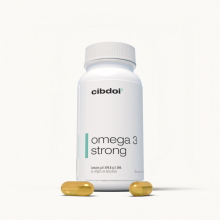Is Omega-3 Bad for Kidneys?
Published:
Omega-3 fatty acids have become wildly popular in recent years, with health experts touting their benefits for heart health, brain function, and more. However, some people with kidney disease are cautioned about taking omega-3 supplements due to concerns about mercury content or improper dosage. This article will explore the evidence on whether omega-3 is safe or harmful for kidneys.
Contents:
- Overview of Omega-3 Fatty Acids
- Omega-3 and Kidney Function
- Potential Risks of High Omega-3 Intake for Kidneys
- Is Omega-3 Recommended for People with Kidney Disease?
- Dosage Recommendations for Kidney Patients
- Best Practices for Safe Omega-3 Use with Kidney Disease
- Conclusion: Omega-3 Appears Safe for Kidney Health in Moderation

Overview of Omega-3 Fatty Acids
Omega-3 fatty acids are a type of polyunsaturated fat found naturally in foods like fish, walnuts, and seeds. The three main omega-3s are:
- Eicosapentaenoic acid (EPA)
- Docosahexaenoic acid (DHA)
- Alpha-linolenic acid (ALA)
EPA and DHA are primarily found in animal sources like fatty fish, while ALA is found in plant sources.
Omega-3s provide many health benefits, such as:
- Reducing inflammation
- Lowering triglycerides
- Improving heart health
- Supporting brain function
However, omega-3 intake is low for most Americans, with average consumption less than 25% of recommended levels. Many people now take omega-3 supplements to increase their intake.
Omega-3 and Kidney Function
Kidneys play a vital role filtering waste and excess fluid from the bloodstream. Two main kidney conditions are:
- Chronic kidney disease (CKD) - gradual loss of kidney function over time
- Acute kidney injury (AKI) - sudden episode of kidney damage
Kidney disease is a growing public health concern affecting 15% of U.S. adults. Risk factors include diabetes, hypertension, and aging.
Omega-3s may impact kidney function in several ways:
Anti-Inflammatory Effects
Inflammation contributes to CKD progression. Omega-3s can reduce cytokine production and suppress genes related to inflammation.
In animal models, omega-3 reduced kidney inflammation and damage. Human studies show mixed results on markers like c-reactive protein (CRP).
Blood Pressure Control
High blood pressure damages kidney blood vessels over time. Omega-3s help expand blood vessels, allowing improved blood flow.
A meta-analysis of 70 trials found omega-3 supplements lowered blood pressure, especially in higher doses. This may indirectly protect kidney function.
Reduced Albuminuria
Albuminuria refers to excess albumin protein in the urine, indicating impaired kidney filtration.
Some research found omega-3 supplements decreased albuminuria levels in diabetics, potentially slowing CKD progression. But results are inconsistent across studies.
Improved Lipid Levels
Dyslipidemia (abnormal blood lipids) contributes to CKD. Omega-3s lower triglycerides and raise HDL ("good") cholesterol.
This may help reduce fat deposition in the kidneys. However, omega-3s also mildly raise LDL ("bad") cholesterol levels.
Antioxidant Effects
Omega-3s contain antioxidants that counter cell damage from oxidative stress. This may protect kidney tubule cells against toxicity and apoptosis (cell death).
Animal studies show omega-3 pre-treatment preserved kidney function and reduced oxidative damage from toxins. Human data is lacking in this area.
Potential Risks of High Omega-3 Intake for Kidneys
Despite those theoretical benefits, there are some potential downsides of high omega-3 intake for those with impaired kidney function.
Toxicity from Contaminants
Fish can accumulate heavy metals like mercury. Certain omega-3 supplements may contain unsafe mercury levels.
Mercury damages kidney tubule cells and causes oxidative stress. Those with CKD are already at higher risk of toxicity due to impaired excretion of toxins.
However, mercury contamination is mainly a concern with poor quality supplements. Reputable brands follow safety guidelines for acceptable limits.
Increased Bleeding Risk
Omega-3s have a blood thinning effect, which can raise bleeding risk in high doses. This effect may be enhanced in advanced CKD which already impairs normal blood clotting.
However, major bleeding events have only been reported with very high intakes exceeding 3 grams per day of EPA/DHA. Lower supplemental doses are generally safe.
Drug Interactions
Omega-3s may interact with common medications that kidney patients take, including:
- Blood thinners - increased bleeding risk
- Cyclosporine - decreased effectiveness, requiring higher doses
- Antihypertensives - may enhance blood pressure lowering
Patients should consult a doctor about potential interactions, especially if taking blood thinners like warfarin. Proper monitoring helps ensure safety.
High Phosphorus Intake
Phosphorus control is important in CKD to prevent bone disease. Some omega-3 supplements are bound to phosphorus rather than triglycerides.
This substantially increases the phosphorus content. CKD patients should use triglyceride-based or phospholipid omega-3 products.
Oxidation and Rancidity
Highly unsaturated oils like fish oil oxidize and become rancid when exposed to heat, light, or oxygen. This generates free radicals that may impair kidney function.
CKD patients have lower antioxidant systems and are vulnerable to oxidative damage. Using refrigerated, antioxidant-fortified omega-3 supplements minimizes this risk.
Is Omega-3 Recommended for People with Kidney Disease?
Based on the research, omega-3 fatty acids appear reasonably safe and potentially beneficial for CKD patients in low to moderate doses, provided some precautions are taken.
Authoritative kidney health groups state:
- National Kidney Foundation: Omega-3s are "likely safe" at doses under 2 grams per day. Select quality supplements and monitor lab results.
- American Kidney Fund: Omega-3 shows promise for reducing albuminuria but requires longer-term study on clinical outcomes. Use with caution.
- Renal Dietitians: CKD patients may continue omega-3 supplements under medical guidance, avoiding phosphorus-bound forms.
No major societies advise avoiding omega-3s altogether in kidney disease. However, some nephrologists are more cautious and prefer restricting omega-3 intake until more data is available, due to hypothetical injury risks.
Monitoring kidney function tests (BUN/Creatinine) and adjusting dosage if needed is wise to identify any potential negative effects.
Dosage Recommendations for Kidney Patients
Most major kidney groups suggest limiting omega-3 intake to under 2 grams daily of combined EPA + DHA in those with moderate to severe CKD.
Doses for health maintenance are around 250-500 mg per day. Therapeutic doses for high triglycerides are 1-2 grams daily under medical supervision.
ALA omega-3 from plant sources is not restricted, as it does not raise bleeding risk or interact with medications. However, the efficiency of ALA conversion to EPA/DHA is poor.
Higher omega-3 intakes exceeding 3 grams daily should be avoided in kidney disease patients given increased risks and lack of evidence for added benefits.
Best Practices for Safe Omega-3 Use with Kidney Disease
Those with impaired kidney function can incorporate omega-3s safely by following these best practices:
- Select quality supplements tested for purity and freshness
- Refrigerate after opening to prevent oxidation
- Take with meals to minimize side effects
- Avoid phosphorus-bound forms if elevated phosphorus level
- Start with low doses (500 mg/day) and increase gradually
- Monitor kidney function tests regularly
- Consult nephrologist about dosage and medication interactions
- Report any side effects like bleeding or bruising promptly
Conclusion: Omega-3 Appears Safe for Kidney Health in Moderation
In summary, research suggests omega-3 fatty acids from fish oil or other sources are likely safe for kidney health and may offer some benefits when used responsibly under medical guidance. However, very high intakes may pose risks for those with impaired kidney function.
Moderately increasing omega-3 intake from foods or quality supplements potentially helps support kidney health, alongside standard medical care. But those with kidney disease should take precautions and consult their nephrologist before using high therapeutic doses of omega-3 supplements.
With careful monitoring and correct dosage, omega-3s appear to have an acceptable safety profile and may be a beneficial component of an overall kidney-friendly nutrition plan. More research is still needed to confirm long-term impacts on kidney disease progression and function.















